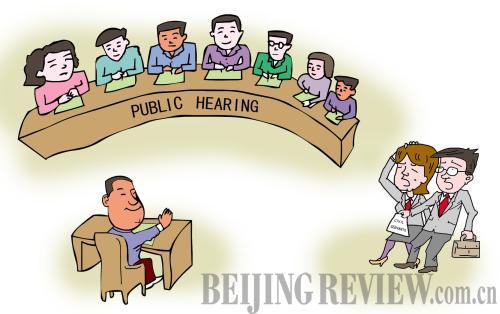|
 |
|
(LI SHIGONG) |
In order to prevent public hearings from becoming a farce, the city of Guangzhou, capital of south China's Guangdong Province, enacted trial regulations to ensure more fairness and justice at public hearings, which are organized when local residents have major disagreements on important city issues.
According to the trial regulations, all representatives at public hearings will be chosen from local residents older than 18, or older than 16 if involving the legal rights and interests of minors. Media will be invited to cover the hearings. But, government officials and civil servants will no longer be able to be selected as representatives for public hearings.
The regulations took effect on September 1, 2011, which soon sparked debate on whether it is appropriate to exclude government officials and civil servants from public hearings.
Supporters think banning government officials and civil servants from hearings is good, as government officials and civil servants would always support the government's policy during hearings. What's more, civil servants or government officials have many other channels for expressing their opinions on major city issues and don't necessarily need public hearings. Therefore, Banning them is a good attempt by the Guangzhou Municipal Government.
On the other hand, opponents think government officials and civil servants are also citizens, and they are entitled to express their opinions in public hearings. Banning them from public hearings is infringing their legal rights. Besides, the true problem of China's public hearing system doesn't lie in whether civil servants should be chosen as representatives, but in its inherent loopholes.
Lin Qi (news.xinhuanet.com): The trial regulations are designed to solicit more public opinion from common citizens. Banning civil servants from public hearings is a good attempt from the local government.
Before making big administrative decisions the government should always collect information from all departments. So, officials and civil servants already have many channels to express their opinions toward major city issues and don't necessarily need to do that in public hearings. In comparison, common citizens have very limited channels to express their opinions on government decisions.
| 